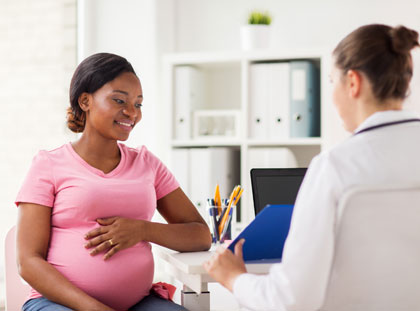 LONG BEACH, Calif., Feb 10, 2022 – MemorialCare Miller Children’s & Women’s Hospital Long Beach has joined the second phase of Cherished Futures for Black Moms & Babies – a two-year cohort, with three other LA County hospitals, Communities Lifting Communities (CLC), the Public Health Alliance, of Southern California (Alliance) and the Hospital Association of Southern California (HASC) — a collaborative effort to reduce Black maternal and infant health inequities in LA County.
LONG BEACH, Calif., Feb 10, 2022 – MemorialCare Miller Children’s & Women’s Hospital Long Beach has joined the second phase of Cherished Futures for Black Moms & Babies – a two-year cohort, with three other LA County hospitals, Communities Lifting Communities (CLC), the Public Health Alliance, of Southern California (Alliance) and the Hospital Association of Southern California (HASC) — a collaborative effort to reduce Black maternal and infant health inequities in LA County.
Guided by data and grounded in Black women’s experiences, this two-year cohort will bring together decision makers from local birth hospitals, public health departments, health plans and Black community leaders to co-design systems-change solutions across clinical, institutional and community systems.
“We are proud to be part of such important health inequity work that really impacts our community,” says Susan Herman, DNP, RN, chief nursing officer, Miller Children’s & Women’s. “The data and the firsthand experiences of Black women prove that this is the time for change in birth equity. We owe this to the community we serve to create real action and improve outcomes.”
In LA County, Black women and families continue to disproportionately experience higher rates of infant and maternal mortality and morbidity compared to other ethnic groups. The data is staggering: the rate of preterm birth among Black women is 50 percent higher than for white or Asian women (1); Black women are four times more likely to die from pregnancy-related causes compared to white women; and Black women report experiencing discrimination when getting medical care more than other racial/ethnic groups (2).
Research shows that these inequities cannot be fully explained by factors such as income, education, or health status. Research points to systemic issues, including racism, toxic stress, and racial bias in health care as central divers for these inequities.
“As a Black woman and OB/GYN, the issues regarding birth equity resonate deeply with me. I will always remember the patient who expressed relief when she found out I would be the attending physician for her case because she stated 'she felt she would be heard,'” says Lauren Yu, M.D., laborist, Miller Children’s & Women’s. “I feel strongly that we can get to a place where the patient of color, and the patient who is underserved can truly be heard, regardless of what ethnicity their provider may be. The work regarding addressing inequity on a multi-system level is critical and I am privileged to be a part of it.”
Cherished Futures uses hospital data to help know where to start in tackling issues such as implicit biased, structural racism, trustworthiness and community engagement. Miller Children’s & Women’s has submitted the preceding year’s data for select measures and will again at the end of the year.
Miller Children’s & Women’s has already taken the preliminary steps to help combat this birth care inequity. For the past two years, Miller Children’s & Women’s has participated in building a birth equity toolkit with the California Maternal Quality Care Collaborative (CMQCC). In addition, a patient survey tool is used to inform and monitor our equity work with a focus on awareness and reduction of implicit bias. In addition, over the past year, birth care and NICU physicians and staff have received electronic training sessions which provide evidence-based approaches to inclusion.
To date birth care equity work at Miller Children’s & Women’s is showing positive results. The BirthCare Center team reports data on Nulliparous, Term, Singleton, Vertex (NTSV) cesarean birth rate – first time pregnant person with a single term infant in a head down position who had a cesarean birth – is about to meet the statewide target of 23.6 percent. Just three years ago that rate hovered around 35 percent.
The awareness and education to leaders, physicians and staff, along with initiatives like Commit to Sit, where the nurse takes the opportunity to sit and get to know her patient better and learn what her objectives and goals are for her labor and birth experience have made a difference.
The second phase of the Cherished Future landmark took place just prior to a Dec. 7 White House statement that identified reducing maternal mortality and morbidity as a strategic objective of the Biden-Harris Administration, and there was a presidential proclamation released during April 2021’s Black Maternal Health Week.
About MemorialCare Miller Children’s & Women’s Hospital Long Beach:
MemorialCare Miller Children’s & Women’s Hospital Long Beach provides specialized pediatric care for children and young adults, as well as maternity care for expectant mothers. Only five percent of hospitals are children’s hospitals, making them unique not only to children’s health care needs in the community, but across the region. Miller Children’s & Women’s is one of only eight free-standing children’s hospitals in California — treating more than 14,000 children each year — and has become a regional pediatric destination for more than 62,000 children, who need specialized care in outpatient specialty and satellite centers. With maternal-fetal medicine specialists and neonatologists available 24/7, Miller Children’s & Women’s cares for women with high-risk pregnancies and premature infants under one roof. Learn more millerchildrens.org.
- LA County Department of Public Health Maternal Child Health, 2016
- LA County Lamb Survey, 2016
